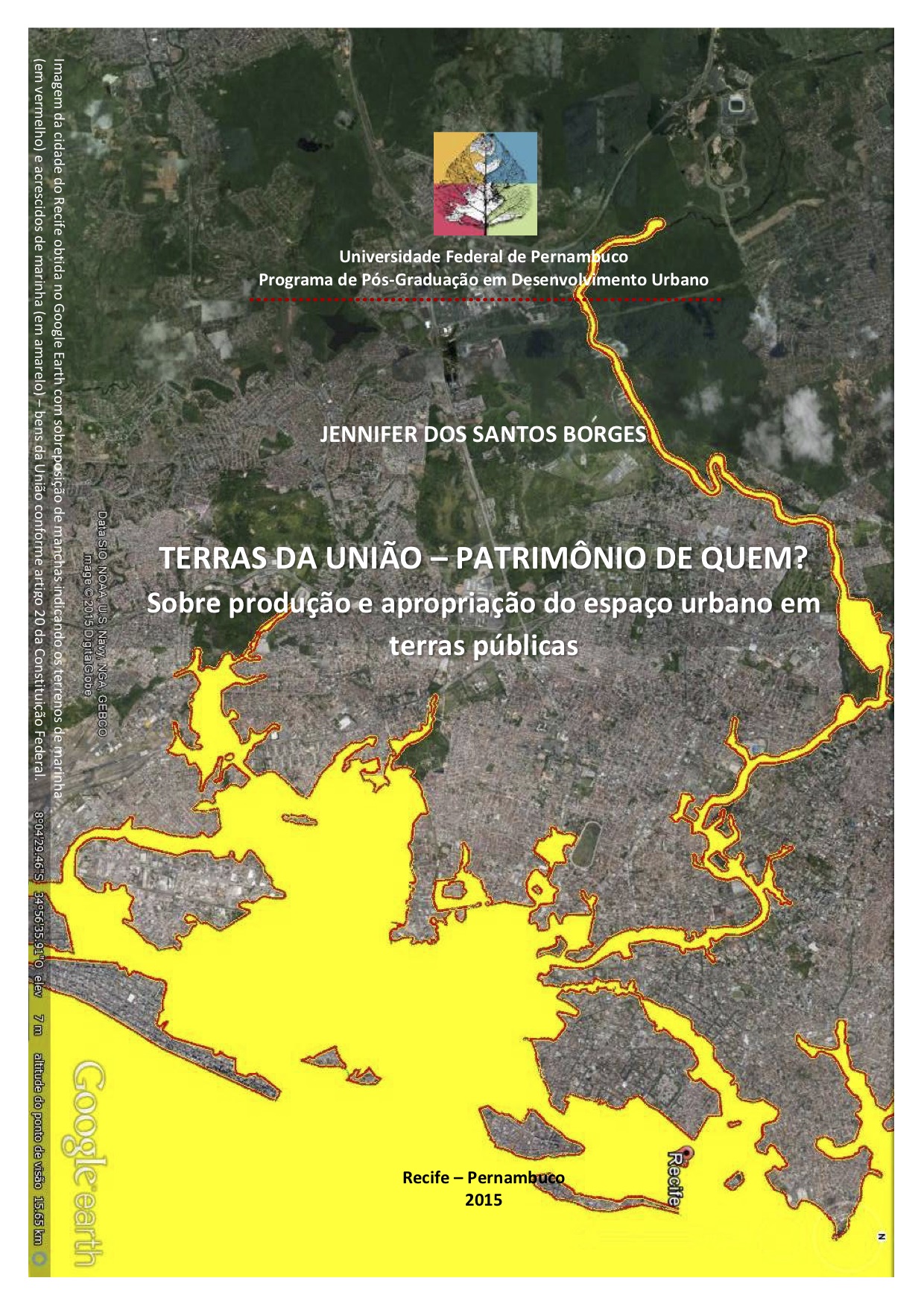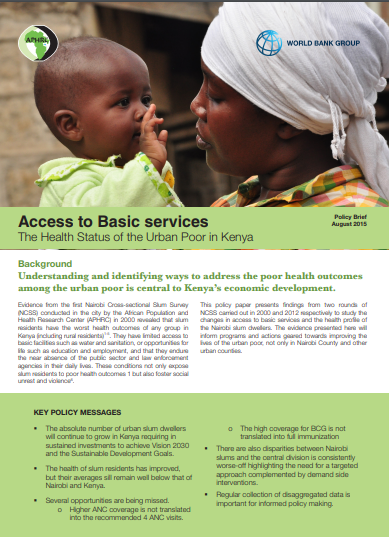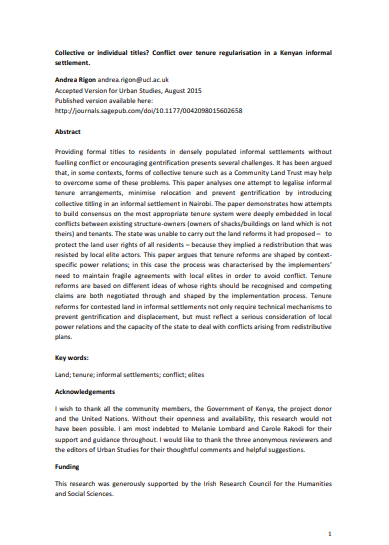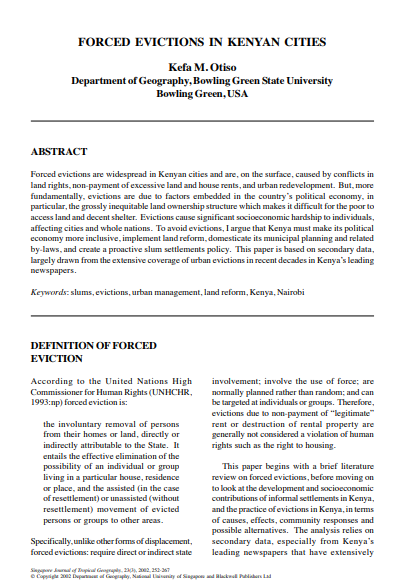Municipal rates policies and the urban poor
In urban areas, the poor struggle to access well located land in cities and legal, institutional and procedural constraints impede secondary residential property markets from functioning effectively in black townships. The purpose of this paper is to examine how municipal property rates policies are, or could be, used as an instrument to promote access by the poor to urban land markets.
The dynamics of poverty : why some people escape from poverty and others don't : an African case study
In urban areas of Cote d'Ivoire, human capital is the endowment that best explains welfare changes over time. In rural areas, physical capital especially the amount of land and farm equipment owned matters most.Empirical investigations of poverty in developing countries tend to focus on the incidence of poverty at a particular point in time. If the incidence of poverty increases, however, there is no information about how many new poor have joined the existing poor and how many people have escaped poverty.Yet this distinction is of crucial policy importance.
Land use land cover change in the fringe of eThekwini Municipality: Implications for urban green spaces using remote sensing
This study sought to determine a 22-year past and future land use and land cover trend and its implication on green spaces in an eThekwini Municipal Area’s peripheral settlement. Results show a consistent pattern of decline in land use and land cover types associated with green spaces and an increase in impervious surfaces. The study is taken to confirm recent urban bio-physical transformation and anticipated increased pressure on peripheral urban green spaces in eThekwini Municipality.
Strategies to help poor people access urban land markets
This case study draws on research that examines
Housing Policy as an Agenda for Elections 2017
This is a policy brief that is derived from a study to understand the dynamics and trends that inform the availability of housing demand and supply in Kenya. It finds that Kenya’s formal housing policy has a strong supply focus that shortchanges rural dwellers whose main challenge to adequate and good housing is based on demand constraints.
Effectiveness of Housing policies and their implementation strategies in the provision of low-cost housing to the urban poor in Kisumu City, Kenya
The purpose of this study was to evaluate the Kenya Government housing policies and strategies for housing the urban poor in Kenya, and how the citizen have benefited from the scheme/plan. Objective of the article was to examine the effectiveness of Housing policies and their implementation strategies in the provision of low-cost housing to the urban poor in Kisumu City. The research question was, how effective are the various Kenya Government Housing Policies and implementation strategies targeting the provisions of low-cost Housing to the urban poor in Kisumu City?
Access to Basic services August 2015 The Health Status of the Urban Poor in Kenya
Evidence from the first Nairobi Cross-sectional Slum Survey (NCSS) conducted in the city by the African Population and Health Research Center (APHRC) in 2000 revealed that slum residents have the worst health outcomes of any group in Kenya (including rural residents). They have limited access to basic facilities such as water and sanitation, or opportunities for life such as education and employment, and that they endure the near absence of the public sector and law enforcement agencies in their daily lives.
Collective or individual titles? Conflict over tenure regularisation in a Kenyan informal settlement
Providing formal titles to residents in densely populated informal settlements without fuelling conflict or encouraging gentrification presents several challenges. It has been argued that, in some contexts, forms of collective tenure such as a Community Land Trust may help to overcome some of these problems. This paper analyses one attempt to legalise informal tenure arrangements, minimise relocation and prevent gentrification by introducing collective titling in an informal settlement in Nairobi.
Gender and Power Analysis in Five Urban Informal Settlements – Nairobi, Kenya
The World Bank (2015) classifies Kenya as a lower middle income country and one of East Africa‘s fastest growing economies. According to Society for International Development (SID) however, Kenya remains one of the most unequal societies when compared to of Uganda and Tanzania (SID, 2004). Inequality therefore remains a key challenge to Kenya. In order to respond to this challenge, there is need for a clear understanding of the causes, nature, effects and manifestations of socio-economic inequalities (SID, 2006).
Forced Evictions in Kenyan Cities
Forced evictions are widespread in Kenyan cities and are, on the surface, caused by conflicts in land rights, non–payment of excessive land and house rents, and urban redevelopment. But, more fundamentally, evictions are due to factors embedded in the country’s political economy, in particular, the grossly inequitable land ownership structure which makes it difficult for the poor to access land and decent shelter. Evictions cause significant socioeconomic hardship to individuals, affecting cities and whole nations.
Periurban Land Redevelopment in Vietnam under Market Socialism
Starting in the 1990s, the Vietnamese state sought to expand and modernise the country’s urban system after four decades of anti-urban policies. This paper examines the reworking of the socialist land regime that followed from this shift. It begins by explaining how new legislation and institutions combined market and socialist principles to lure domestic enterprises into realising the state’s new urban ambitions. It then shows how this hybrid reordering of policy triggered local experiments with periurban land redevelopment and new forms of alliances between the state and private capital.










